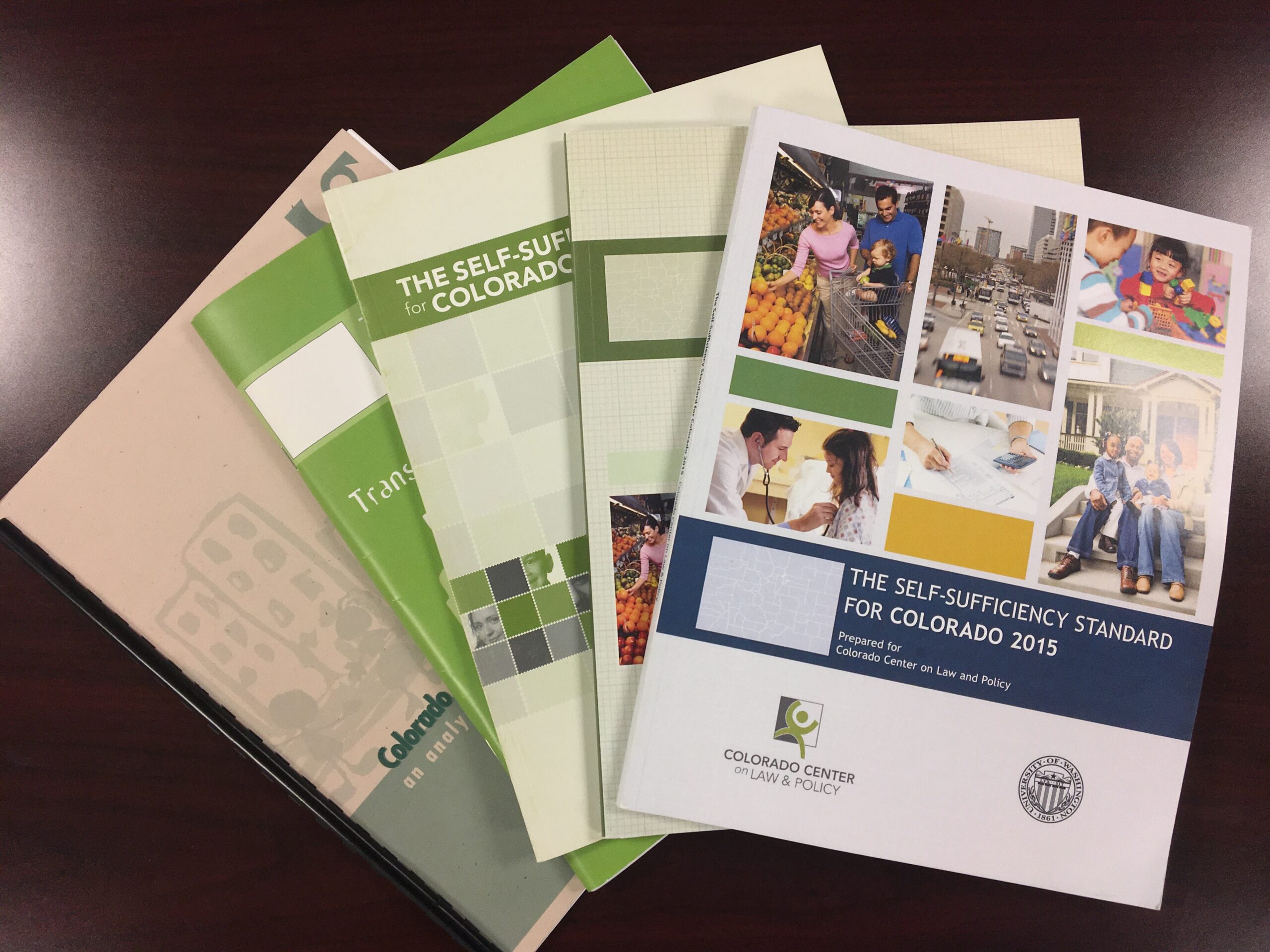A summary of the list of recommendations on the implementation of the OBBBA in Colorado regarding public benefits systems and work requirements.
Recent articles
CCLP testifies in support of Colorado’s AI Sunshine Act
Charles Brennan provided testimony in support of Senate Bill 25B-004, Increase Transparency for Algorithmic Systems, during the 2025 Special Session. CCLP is in support of SB25B-004.
Coloradans launch 2026 ballot push for graduated state income tax
New ballot measure proposals would cut taxes for 98 percent of Coloradans, raise revenue to address budget crisis.
CCLP statement on the executive order and Colorado’s endless budget catastrophe
Coloradans deserve better than the artificial budget crisis that led to today's crippling cuts by Governor Jared Polis.
20th Anniversary Milestones: Report Sharpens Focus on Self-Sufficiency

In celebrating the 20th anniversary of Colorado Center on Law and Policy, we are publishing a series of vignettes about the organization’s most significant accomplishments.
For 20 years and counting, Colorado Center on Law and Policy has been an organization that cares about economic security. In addition to advocacy work, litigation and occasional representation, CCLP has published heavily researched, data-driven reports to inform legislators, direct-service providers and the general public about financial realities in Colorado.
One of our most successful and influential reports is the Self Sufficiency Standard (SSS), an analysis commissioned by CCLP and prepared by Diana M. Pearce of the Center for Women’s Welfare at the University of Washington. The findings create a picture of what kind of income individuals and families in Colorado must make to be “self-sufficient,” or not have to rely on public-assistance programs like Medicaid or Supplemental Nutrition Assistance Program (SNAP). These data also show how many people fall below this standard, providing a more nuanced picture of financial well-being and who needs public assistance than federal poverty statistics.
First published in 2000 under the leadership of then CCLP Executive Director Maureen Farrell-Stevenson, CCLP has commissioned a SSS or related report roughly every three years, with the latest being published in 2015. An updated SSS, along with two supplemental reports, is scheduled for release in late 2018
The SSS specifically breaks down the costs of housing, child care, food, transportation, health care and other necessities in each of Colorado’s 64 counties. As one of the most comprehensive measures of economic security available, the SSS is often referenced by managers of workforce training programs, direct-service providers, policymakers, legislators and the media as a barometer for wage adequacy and policy effectiveness. In 2007, CCLP published a companion report that detailed demographic information. Titled “Overlooked and Undercounted,” the report analyzes specific demographic and job information, identifying what occupations and what ages, ethnicities, or genders tend to fall below the standard.
But the SSS isn’t just a book of statistics. It’s an invaluable tool that can be used in a number of ways. “The reports are packed with data, but that wasn’t enough to motivate foundations to support the project,” said Claire Levy, Executive Director of CCLP. “To raise the money we would need, I knew I had to demonstrate that these reports were important instruments for policymakers, service providers, philanthropists and the public.”
Levy knew there were plenty of concrete examples to demonstrate the value of the SSS when seeking funding for the 2018 reports. “The Human Relations Commission for the City of Boulder asked for my help in basing a living wage proposal on the 2015 Standard. The campaign to raise the Colorado minimum wage relied on the standard to demonstrate the challenge of living on the existing minimum wage in most Colorado counties. Directors of county departments of human services told me about the ways they use the standard to establish child care reimbursement rates and eligibility thresholds. I fielded calls from workforce centers in mountain counties requesting copies of the 2015 Standard for their board members,” Levy recounts. These examples helped raise the funds needed to publish the reports and fund outreach plans to distribute the reports statewide. Nan Sundeen, Director of Human Services for Pitkin County, reported to Levy that she used the SSS in many presentations to the Board of County Commissioners and Aspen City Council to illustrate the difficulties of living in Pitkin and the need for subsidies for child care, housing, transportation and medical care. “We also used the SSS to justify bringing a Federally Qualified Health center (FQHC) to Basalt and covering the operating costs above what the feds reimburse,” said Sundeen.
Following the release of the SSS, CCLP staff will engage in extensive outreach efforts across the state to promote and publicize the findings of the report to Colorado legislators and relevant parties, such as the Colorado Department of Human Services, community colleges and nonprofit organizations. In 2015 and the year following, CCLP staff members coordinated 26 total presentations across the state and delivered hundreds of mailings to relevant partners and interested parties
“The Self-Sufficiency Standard provides an objective tool for policy development,” said Chaer Robert, manager of CCLP’s Family Economic Security program. “County-specific figures engage policymakers by providing a specific benchmark to consider when discussing housing, workforce development, child care, etc. The Self-Sufficiency Standard provides a quick reality check for assumptions such as how much people can afford to pay for college or save for retirement.”
Apart from being an invaluable advocacy tool, the SSS can also guide the budgeting strategy of Coloradans of all ages who are working to manage their own finances. Location-specific and updated each release year by concrete data from our state, its uses are far-reaching, timely and relevant.
-By Duranya Freeman
